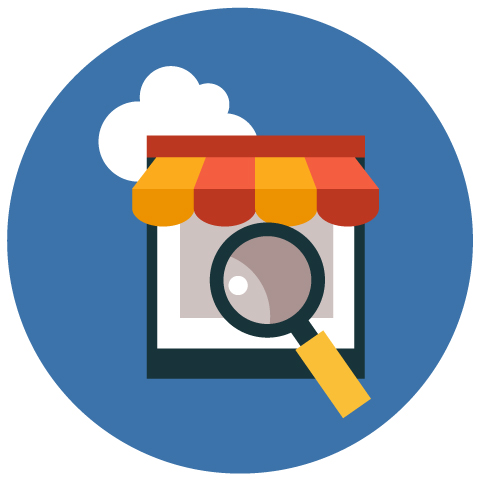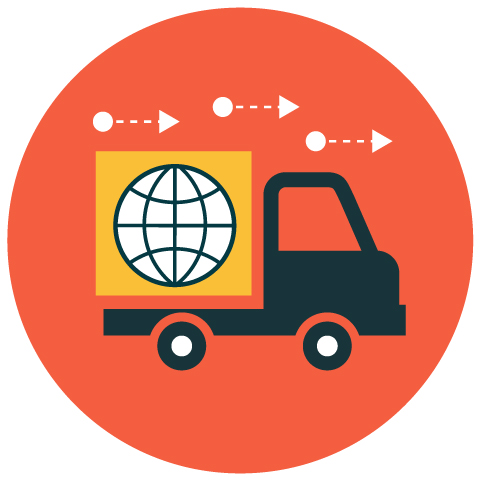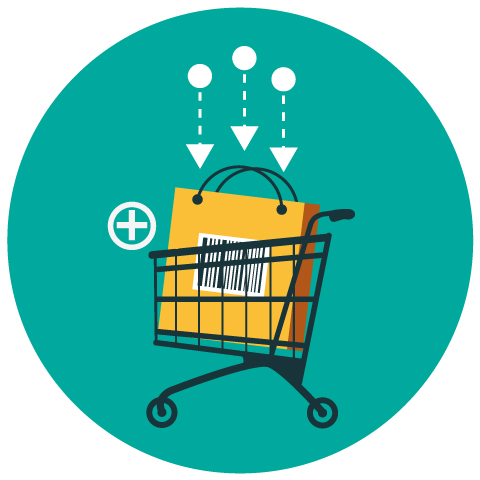
Online marketplaces have a lot to offer, even if they don’t give you complete control. They are typically easy to set up, they offer access to an existing customer base that trusts and shops with them regularly, and they understand the needs of the craft business owner. Most online platforms fall under one of three categories:

Internet Craft Fair
Like the in-person variety, these third-party marketplaces allow you to set up a “booth” or online shop. They handle payment for you, but you have little room for customization—you’re selling under their umbrella brand using a rather rigid shop template. Aftcra, ArtFire, Etsy, and Handmade at Amazon are all great examples.
Online Production House
Many illustrators, designers, and digital craftspeople use these services to sell their art without needing to worry about the actual production. Upload your artwork and choose your product offering, then they’ll produce the item purchased (a t-shirt, mug, or art print, for example) and send it to your customer for you. Take a look at ImageKind, Society6, and Spreadshirt to get a sense for how these work.


E-Commerce Platform
Use these services to create your own custom branded shop, then integrate it into your own website. You are responsible for fulfilling orders yourself, but they still handle payment processing. Popular examples include Big Cartel, Shopify, StoreEnvy, and WooCommerce.
Before you begin evaluating online marketplaces, you’ll want to make sure you’re ready to sell online. Ask yourself these five questions to start:
- What are your selling priorities? If you are focused on selling your crafts to local customers, an online shop may not be necessary. If you want to expand your audience to a broader market, selling online is a natural next step.
- Are your prices adequate? Your retail price needs to accommodate materials, payment processing and marketplace fees (usually around 10%), and shipping costs, and still pay yourself appropriately. If you expect to sell wholesale in the future, your prices should also be able to handle a 50% wholesale discount and still be profitable.
- Are your marketing materials at the ready? Taking the time to write stellar item descriptions and investing in the best product photos you can afford will have the biggest impact on convincing potential customers to click that “buy” button.
- How much time are you willing to put into marketing? It’s easy to think that all you have to do is list something and let the people come to you. But online marketplaces are not your sales rep—as the maker, you are the only person qualified to find your customer and bring them to your shop, so that puts you in charge of marketing efforts.
- Do you have time and capacity to manage and fulfill orders consistently? Knowing how long it takes you to fulfill orders, relist items, order supplies, and produce more inventory can help you gauge what kind of commitment you’ll need to make to this selling channel.
Once you’re ready to research your online options, a simple pros and cons list may not cut it. Grab a sheet of paper and create a large grid with a row for each of the five questions below and a column for each marketplace you’re considering, then see how each measures up.
- Does your target customer shop here already? An online marketplace should provide access to the people that are most likely to purchase your work. If they serve a different audience, that’s the first sign they’re not a good fit.
- Why do you want to sell here? Following the masses to an online marketplace isn’t always the best idea. A platform where you can stand out will make it easier to find your customer instead of swimming through a sea of similar sellers.
- What does it take to sell here? Know the true costs involved, including listing and processing fees, read and understand the legal agreements, and talk with other makers who use that platform to see what advice they have.
- What tools do they provide? Some marketplaces have active editorial and social media channels that feature sellers, provide access to low-cost advertising, fulfillment services, wholesale networks, and more. These fringe benefits can set one marketplace apart from the rest, or may be more trouble than they’re worth.
- How will this integrate with your existing business? If you sell out of something in person at a craft fair, managing that listing online should be as effortless as possible. Some platforms integrate with popular online accounting and inventory management software, or offer offline payment processing using their app and a smartphone.

Selling online is one of the easiest experiments you can run for your business, so if one marketplace stands out above the rest, it’s time to give it a shot. By keeping an eye on your sales data, traffic analytics, and listing information, you’ll have a good handle on what’s working and what needs to change. Tweak your listings, experiment with advertising, and adjust your product photos to see what delivers the best results. And if it comes right down to it, leaving one platform for another or maintaining multiple platforms at once isn’t rocket science. Just remember—finding your customers and directing them to your online shop is the single most important thing you can do to have a successful online craft business.
+++
Are you trying to choose which ecommerce platform is right for your business? When you become a Craft Industry Alliance member you get access to our Ecommerce Platform Fees Calculator. This handy tool allows you to enter your product price and see how much you’d pay in fees on every major platform including Etsy, Shopify, Big Cartel, Squarespace, and WooCommerce. Join today for instant access.

Isaac Watson
contributor
Isaac founded and runs Maker’s Nation, a nonprofit offering business education and community support for creative small business owners. In addition, Isaac is a professional conference producer and event organizer who loves spending his spare time making with his hands, including cooking, puttering in his yard, renovating houses, and building a tiny cabin on a mountain. He lives in Vancouver, Washington.

Thank you for the article, it would be nice to see a comprehensive list showing pros and cons of e commerce platform and their fees.